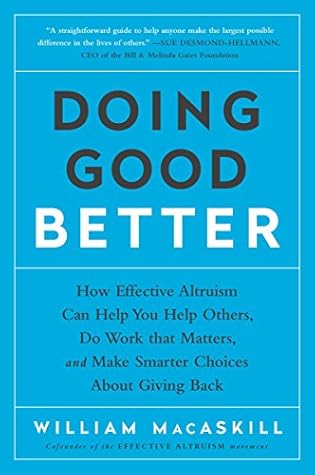More on this book
Community
Kindle Notes & Highlights
Read between
March 27 - March 30, 2017
This “water and diamonds” paradox shows the importance of what economists call thinking at the margin: assessing the value of an additional thing—what is known in economics as its marginal utility—rather than thinking about the average value of that thing.
Ironically, the law of diminishing returns suggests that, if you feel a strong emotional reaction to a story and want to help, you should probably resist this inclination because there are probably many others like you who are also donating.
Earning to give seems to be an enormously powerful way of doing good. It exploits the fact that even typical workers in developed countries are among the top income earners in the world and that there are some charities that do huge amounts to help the world’s poorest people for relatively little money.
Our predicament with climate change is no different. If climate change is happening and we don’t take action, millions of lives will be lost and the world economy will lose trillions of dollars. If climate change isn’t happening and we do take action, the costs are much lower. We would have wasted some amount of resources developing low-carbon technology and slowed economic progress a bit, but it wouldn’t, literally, be the end of the world.
Professor Christopher Cramer at the University of London School of Oriental and African Studies led a team of researchers who conducted a four-year study on earnings of Fairtrade workers in Ethiopia and Uganda. They found that those Fairtrade workers had systematically lower wages and worse working conditions than comparable non-Fairtrade workers, and that the poorest often had no access to the “community projects” that Fairtrade touted as major successes.
Using this figure, the average American adult would have to spend $105 per year in order to offset all their carbon emissions. This is significant, but to most people it’s considerably less than it would cost to make large changes in lifestyle, such as not flying. This suggests that the easiest and most effective way to cut down your carbon footprint is simply to donate to Cool Earth.
Moral licensing shows that people are often more concerned about looking good or feeling good rather than actually doing good. If you “do your bit” by buying an energy-efficient lightbulb, your status as a good human being is less likely to be called into question if you subsequently steal a small amount of money.
Keeping your options open also provides a reason for building transferable skills—such as sales and marketing, leadership, project management, business knowledge, social skills, personal initiative, and work ethic—rather than highly specific skills, like piano tuning or knowledge of the shipping industry.
As a volunteer, you’re often not trained in the area in which you’re helping, which means the benefit you provide might be limited. At the same time, you’re often using up valuable management capacity. For that reason, volunteering can in fact be harmful to the charity you’re volunteering for. Anecdotally, we have heard from some nonprofits that the main reason they use volunteers is because those volunteers subsequently donate back to the charity.
If you feel empowered by this, by far the most important thing for you to do is ensure that this feeling doesn’t dissipate over the coming weeks or months. Here are some ideas about how best to do that.


